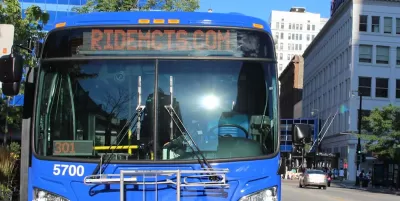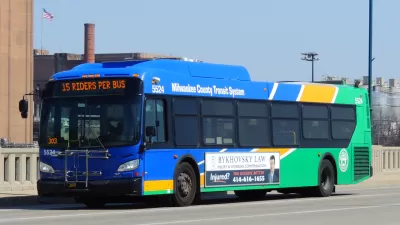New technology allows for more streamlined travel and fare capping for riders across the region.

The City of Waukesha’s transit system joined the Milwaukee County Transit System’s (MCTS) fare collection system, making it easier for residents to get around the region, reports Graham Kilmer in Urban Milwaukee. “The system’s riders have been able to pay their fares through WisGO since early June, but now Waukesha Metro is making the full switch to WisGo as their only fare collection app.”
The switch allows Waukesha Metro to take advantage of new technologies available in part due to Milwaukee’s bus rapid transit service, which “employs a number of technologies that are new for the transit system, including off-bus fare validators and real-time bus arrival signs.”
The system includes fare capping, which limits the amount charged for daily, weekly, and monthly use. “For example, a rider cannot spend more than $4 a day, $19.50 a week or $72 a month.”
FULL STORY: Waukesha Joins Milwaukee’s Transit Fare System

Study: Maui’s Plan to Convert Vacation Rentals to Long-Term Housing Could Cause Nearly $1 Billion Economic Loss
The plan would reduce visitor accommodation by 25,% resulting in 1,900 jobs lost.

North Texas Transit Leaders Tout Benefits of TOD for Growing Region
At a summit focused on transit-oriented development, policymakers discussed how North Texas’ expanded light rail system can serve as a tool for economic growth.

Why Should We Subsidize Public Transportation?
Many public transit agencies face financial stress due to rising costs, declining fare revenue, and declining subsidies. Transit advocates must provide a strong business case for increasing public transit funding.

How to Make US Trains Faster
Changes to boarding platforms and a switch to electric trains could improve U.S. passenger rail service without the added cost of high-speed rail.

Columbia’s Revitalized ‘Loop’ Is a Hub for Local Entrepreneurs
A focus on small businesses is helping a commercial corridor in Columbia, Missouri thrive.

Invasive Insect Threatens Minnesota’s Ash Forests
The Emerald Ash Borer is a rapidly spreading invasive pest threatening Minnesota’s ash trees, and homeowners are encouraged to plant diverse replacement species, avoid moving ash firewood, and monitor for signs of infestation.
Urban Design for Planners 1: Software Tools
This six-course series explores essential urban design concepts using open source software and equips planners with the tools they need to participate fully in the urban design process.
Planning for Universal Design
Learn the tools for implementing Universal Design in planning regulations.
Ascent Environmental
Borough of Carlisle
Institute for Housing and Urban Development Studies (IHS)
City of Grandview
Harvard GSD Executive Education
Toledo-Lucas County Plan Commissions
Salt Lake City
NYU Wagner Graduate School of Public Service





























